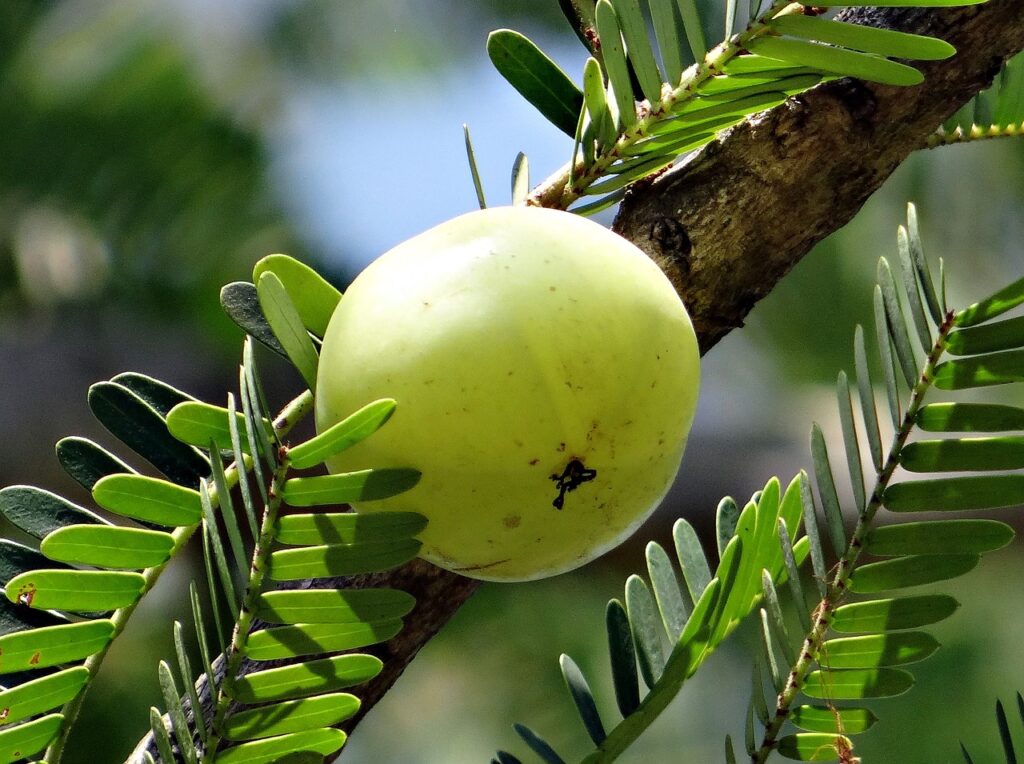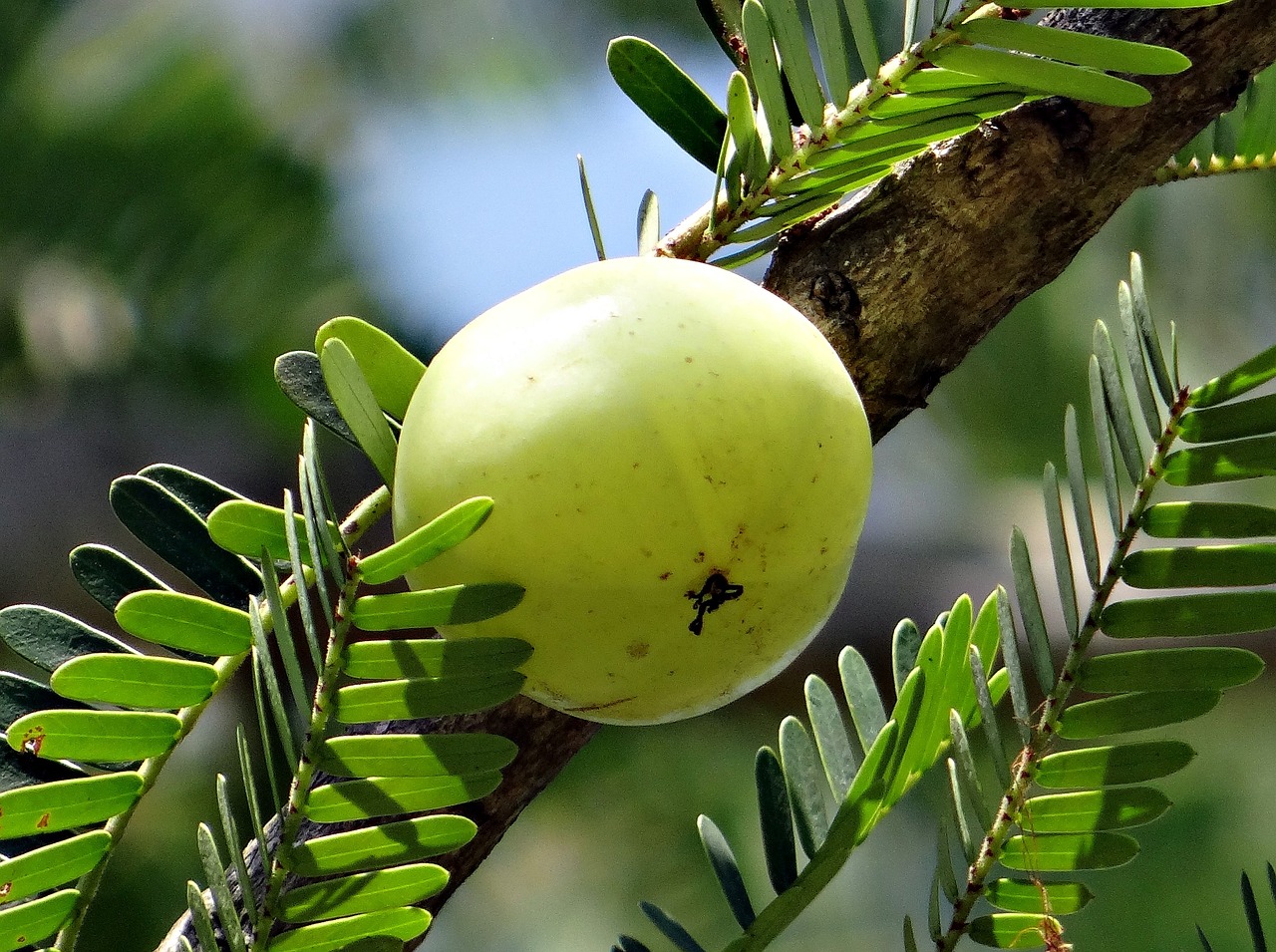Amla, also known as an Indian gooseberry, is a fruit that holds a significant place in traditional Ayurvedic Medicine and is celebrated for its diverse health benefits. Let us dive into the nutrient facts, benefits, contradictions and ways to use of Amla.
Nutrient Facts of Amla:
It is a nutritional powerhouse rich in various vitamins and minerals. It contains high levels of vitamin C, which is essential for immune function, collagen synthesis and antioxidant defense. Besides vitamin C, it provides vitamin A, vitamin E and several B vitamins. Additionally, it contains minerals such as calcium, phosphorus, iron, carotene, chromium, choline and potassium.

Health Benefits of Amla:
Rich in Antioxidants:
It is renowned for its antioxidant properties, which help neutralize free radicals in the body, reducing oxidative stress, supporting overall health and reduce the risk of chronic diseases. In addition, it contains high level of ascorbic acid, ranging from 1100 to 1700 milligram per 100 gram of fruit.
Boosts Immunity:
It is known for its immune-boosting properties, primarily due to its high vitamin C content. Vitamin C is essential for the proper functioning of the immune system, as it helps stimulate the production of white blood cells and has antioxidant properties that protect cells from damage. Including Amla in your diet may contribute to overall immune health, helping your body better defend against infections and illnesses.
Improves Digestive health:
It has positive effects on digestive health. It contains dietary fiber, which can aid in promoting regular bowel movements and preventing constipations. Additionally, it may help balance stomach acids and support the digestive process. Compounds in amla, such as polyphenols and antioxidants, could contribute to reducing inflammation in the gastrointestinal tract. Including amla in your diet may support overall digestive well-being.
Enhances Skin Health:
It is beneficial for skin health due to its high vitamin C content and antioxidant properties. Vitamin C plays a crucial role in collagen synthesis, which is essential for maintaining skin elasticity and preventing signs of aging. The antioxidants in it help neutralize free radicals, protecting the skin from oxidative stress and contributing to a healthy complexion. Including it in your diet or using Amla-based skin care products may contribute to improved skin health by promoting collagen production and providing antioxidant support.
Regulate Blood Sugar:
There is some evidence to suggest that it may have a role in helping prevent type 2 diabetes and regular blood sugar levels. It contain polyphenols and chromium, which have been studied for their potential antidiabetic effects. These compounds may help improve insulin sensitivity and regular blood sugar levels. However, it is important to note that while it can be part of a healthy diet that supports overall well-being, preventing type 2 DIABETES involves the combination of factors including a balanced diet, regular physical activity and maintaining a healthy weight. Alone it is not a guaranteed preventive measure and individual should consult with a doctor for personalized advice on diabetes prevention.
Heart Health:
It may contribute to heart health due to its antioxidant and anti inflammatory properties. The high vitamin C and potassium content in it helps protect the cardiovascular system by reducing oxidative stress and supporting the health of blood vessels. Some studies suggest that it may have a positive impact on cholesterol levels by lowering bad cholesterol (LDL) and increasing a good cholesterol (HDL).
Hair Care:
It is traditionally useful for hair health. It can prevent hair loss, stimulant hair growth and reduce premature graying. Applying Amla oil or consuming it can benefit the hair. It helps your hair by strengthening hair roots, reducing hair fall and enhancing the growth rate. It also delays premature graying of your tresses! Aloe vera, the second ingredient, provides deep moisturization to the scalp and hair.
Anti-inflammatory Properties:
It has anti-inflammatory effects, which may help reduce conditions like arthritis and inflammation-related disorders. Studies have also shown that its extract has strong anti-inflammatory effects and inhibits microbial infection-induced expression of the neutrophil chemokines interleukin (IL)-8, GRO-alpha, GRO-gamma and pro-inflammatory cytokine, IL-6 in the bronchial epithelial cells.
Liver Health:
It has potential benefits for liver health. Its antioxidant properties may help protect the liver from oxidative stress and inflammation. Some studies suggest that it may support liver function by reducing liver damage caused by toxins. In the contest of fatty liver, limited research indicates that it may have a protective effect against hepatic steatosis, a condition characterized by accumulation of fat in the liver cells. However, more research is needed to establish the extent of Amla’s effectiveness for fatty liver.
Brain Health and Improve Memory:
The phytonutrients and antioxidants in it can benefit memory by fighting against free radicals that can attack and damage brain cells. Amla’s high concentration of vitamin C helps your body produce norepinephrine, a neurotransmitter believed to improve brain function in people with dementia.
Contraindications:
While Amla is generally safe for consumption, individuals with certain conditions should exercise caution.
- Kidney Disorders: Amla’s high oxalate content may pose a risk for people with kidney stones. Consult a doctor before including Amla in the diet.
- Allergies: Some people may be allergic to Amla. If any allergic reactions occur, such as itching or swelling, discontinue use and seek medical advice.
- Pregnancy and Breastfeeding: Pregnant and breastfeeding women should consult with their doctor before incorporating Amla supplements into their routine.
How to use:
- Fresh: Eat raw Amla as a snack or incorporate it into salads for a burst of vitamin C.
- Juice: Extract juice from fresh Amla and consume it in the morning for a nutrient boost.
- Powder: Amla powder is a versatile option. Mix it with water, yogurt or smoothies for an easy intake of amla’s benefits.
- Supplements: Amla supplements including capsules and powders are available follow recommended doses guidelines. Amla also can be used as pickle, chutney and murabba.
- In Hair Care: Apply Amla oil to the scalp for improved hair health. Amla-based shampoos and conditioners are also available.
Conclusion:
In conclusion, Amla’s nutrient rich profile and numerous health benefits, make it a valuable addition to a balanced diet. However, people should be mindful of contradictions and consult with a doctor when necessary. Embracing Amla in various forms can contribute to overall well-being, from immune support to radiant skin and hair. To get more more insights about overall well being, read my latest book, the magical ways for sparkling lifestyle.


Leave a Comment